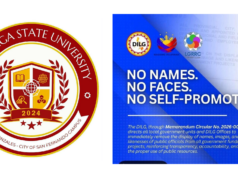The recall petition against Gov. Eddie Panlilio is stirring up a maelstrom sucking so many into the pit of disharmony. Not to mention headaches no aspirin could dissipate.
Even journalists covering the issue get sucked in. I wrote recently an article which I emailed to a national newspaper I write for. Two days later, I got cellphone texts asking what in hell I meant when my purported article quoted former Panlilio chief of staff Archie Reyes as having “resigned the recall petition”.
One texter, identifying herself as a former Panlilio crusader, sternly demanded correction.
I rushed to my computer and dug up my story from my sent files in Yahoo. Now, sent files can’t be altered as they are. I noted there was no such preposterous phrase as “resigned the recall petition”. I got in touch with the newspaper editor to complain.
Someone, indeed, took the liberty to make some changes in my story in a bid to shorten it. Just as the same person, I suspect, also attributed to a Comelec central office personnel a quote which, in my original story, belonged to Pampanga Comelec chief Temmie Lambino.
Such things are not uncommon in journalism, given the daily deadline grind both editors and reporters cope with. Even more often, reporters get into trouble for errors editors commit in assigning headlines or titles to their stories.
There are, of course, instances when reporters are given headaches by people with penchant for overblown dramatics. Like a former Zambales elective official who sent me a press release via email saying he and other colleagues resigned from a task force on something. While I wrote in my story that they indeed resigned, my editor used the word “quit” in the title.
Another email ensued from the ex-official, this time addressed directly to my Manila-based editor, accusing me of inaccuracy which, he stressed, had put him and other members of his task force “in bad light”.
His email, as full of archaic dramatics as his initial press release, declared he and task force members “did not quit”, for they, noble and tasked to pursue nothing but, would never do so in their crusade against blah blah. They did not quit, they only resigned, the email said.
How I wanted to tell him they couldn’t have resigned had they not quit, as they couldn’t have quit had they not resigned.
My editor forwarded the email to me. I think my outrage was worse than that of the sender’s. I had wanted to call him up, tell him the agony I had configuring some logic which his fractured grammar effectively cloaked in his press release, and that when I finally unearthed what he meant, wrote about the resignation act, no more, no less in my story. And tell him further that the task of using “quit” in the title was in the realm of the editor to whom he had spilled the grave injustice I had supposedly inflicted on their noblest intentions. Not that I wouldn’t interchange quit and resign; the words were in the realm of synonymous in the press release.
But then, it’s not good for the health of a journalist to confront every such situation that will always crop up for as long as they remain journalists. Correct if anything has to be corrected, write what has to be written to straighten out flawed press releases.
Meanwhile, controversies on the recall petition against Panlilio will linger on and cultivate more conflicts for big headlines until, finally, all realize that a special gubernatorial election, which is a major objective of the recall exercise, can’t be held after all because the Comelec has no funds for it, nor for the 18 other recall petitions already signed in required measures by constituents in other parts of the country and long pending before the Comelec in Manila.
Journalists covering the recall will continue to be suspected of being pro this, pro that, but they have to write stories amid the perils of deadline, among other pressures. Almost like saints carrying on and facing small persecutions silently.




